Propaganda and censorship are as old as war itself, but that has generally been a struggle to control the story rather than targeting the storyteller. In an ideal world, journalism is not supposed to be a dangerous profession; it has always had its risks of course, but as storytellers, we are supposed to be intermediaries rather than activists, observers rather than participants.
However, a look at the statistics shows some disturbing numbers. The New York-based Committee for the Protection of Journalists (CPJ) has been tracking the number of journalists and media workers who have been killed since 1991.
Its graphs show a few bad years in the early 90s when many reporters died in two significant conflicts – Rwanda and the former Yugoslavia. There, most of the casualties were local journalists who were killed because of their ethnicity rather than their jobs. Later, the numbers tailed off, with between 30 and 40 being killed each year until 2004, when the numbers shot up again, with anywhere between 70 and 110 dying in any given 12-month period.
This increase in violence against journalists registered since the mid 2000s can be attributed to different causes. Of course, one of them is war. Numbers show that when there is open conflict, a greater number of journalists are killed.
In Arab world countries in particular, violence against journalists has seen a major upshot after 9/11. Journalists killed in Iraq and Syria represent 20 percent of the total of dead journalists documented by the CPJ since 1992.
Both countries are considered among the deadliest countries in the world for journalists. But 9/11 and its subsequent “War on Terror” has affected the safety of journalists in specific regions of the world, such as Arab countries. I have always thought about them as a pivotal point for journalism – specifically the moment when US President George W. Bush declared that, “You are either with us, or you are with the terrorists”. That one statement alone made the conflict a binary choice.
You could either be on one side of the battle, or the other, but you could not be neutral. For journalists, the implications were profound – the neutral, independent space that our professional standards demanded had suddenly evaporated overnight.
The “War on Terror”
A good friend once rather dryly described the “War on Terror” as a war on an abstract noun. It means whatever anyone wants it to mean. It is both open-ended, with “victory” impossible to define, and indefinable. Throughout history, more than one war or conflict has been articulated around narratives that make it easier for human rights to be violated systematically precisely because the line between citizen or civilian and enemy becomes completely blurred. Cases in point are the military dictatorships in Argentina and Chile, where the “enemy” was purportedly also hard to define.
The difference between these kinds of conflicts and the War on Terror is that the latter has an international dimension and a global reach and impact. We in the West tend to think pretty clearly about what fighting against terrorism is. It is about stopping the slaughter in places like Paris, or the random bombings in Kabul and Baghdad, or home-grown incidents like the Lindt Café attack in Australia, or the nightclub shooting in Orlando. But consider what some of the Islamists I met in prison told me. For them, the “War on Terror” means stopping the drone strikes that hit a hospital in Afghanistan, or wedding parties in Waziristan, the barrel bombs that fall in Aleppo, and yes – the random arrests, the beatings and torture in Cairo’s prisons.
In war, the battlefield extends to the place where ideas themselves are prosecuted – and that includes the media. Different parties or factions fight over winning the public’s favour. However, in recent conflicts, we have increasingly seen that journalists have no longer simply witnessed and reported on these struggles.
We have become, by definition, a means by which war itself is waged. That is not an abstract concept. In one of the very first shots in this battle of ideas, the US Air Force bombed Al Jazeera’s bureau in Kabul in November 2001.
Officially the US said it was a mistake, but it is hard to escape the conclusion that it attacked the bureau because it wanted to shut down the access that journalists from the Arabic service had to sources in the Taliban and al Qaeda.
Whatever you might think about the rights or wrongs of those groups, the US appeared to strike at a media organisation, because it disapproved of the ideas it was presenting. This is one example of how the false dichotomy “either you are with us or with the terrorists” operated.
On the other side of the ledger, the same dynamic can be observed. A few weeks later, the Taliban captured and murdered a group of four journalists on the road from Pakistan to Kabul, simply because of who they were, rather than because of anything they had done.
And then came the execution of Daniel Pearl – the Wall Street Journal reporter who was famously kidnapped and beheaded in Pakistan a few months later. In posting the execution online, al Qaeda used new media to propagate their own message – that anyone who challenges their view of the way society should work will be executed. What al Qaeda began, ISIL has mastered with sickening snuff videos, and their use of social media to both recruit and terrorise. In this war, new media has become as much a weapon of terror as any bomb.
Of course, the first instincts of any government – indeed of any society – that finds itself under attack is to close ranks, to prioritise security over all else, to silence dissent and control public opinion. But now, with the “War on Terror” and “national security” as an excuse, governments the world over are limiting free speech and censoring the press.
Here are just a few examples that CPJ presented to a US Congressional committee:
-
In Tunisia, the government proposed a draft legislation in 2015 that would criminalize “denigration” of police or other security forces. The anti-terrorism law allows for prison sentences of up to five years for a person found to have praised a terrorist act or a person connected to it. Such over broad provisions, which echo laws in other countries in the region, infringe on the rights to receive and impart information and to free expression.
-
In Cameroon, freelance journalist Simon Ateba was reporting on the condition of Nigerians in refugee camps in Cameroon and Chad, including interviewing those who fled Boko Haram. He was arrested and accused of spying on behalf of Boko Haram.
-
The government's counter-extremism strategy provides the United Kingdom's broadcasting regulator, Ofcom, with increased power to take action against radio and television channels for broadcasting “extremist” content. It also requires internet service providers to do more to take down extremist content and to track those who posted it. We have already seen British terrorism legislation used to violate press freedom. In August 2015, British police used special powers under the Terrorism Act of 2000 to seize the laptop of Secunder Kermani, a reporter for BBC Two's flagship news show, “Newsnight”. The British Government Communications Headquarters has scooped up emails to and from journalists working for some of the United States’ and the United Kingdom’s largest media organisations.
-
In Russia, the only remaining independent TV news station, Dozhd TV, was subjected to an audit to check for anti-terrorism violations, among other purported legal abuses, in what CPJ and others believe is a politically motivated attack. Attempts to use anti-extremism laws to restrict news and reporting are not new. In 2006, a Russian bill broadened the definition of extremism to include media criticism of public officials.
Reporting Conflict from Egypt: A Personal Account
My personal direct experience stems from covering recent events in Egypt. In the Arab Spring context, my two colleagues and I – producers Mohammed Fahmy and Baher Mohamed – were arrested and charged with being members of a terrorist organisation; of supporting a terrorist organisation; of financing a terrorist organisation; and of broadcasting false news to undermine national security.
What we were actually doing was covering the unfolding political struggle with all the professional integrity that our imperfect trade demands – and that included reporting that we believed was both accurate and balanced.
In our case, balanced reporting involved interviewing members of the Muslim Brotherhood who, only six months earlier, had been ousted from power after forming the country’s first democratically elected government. In other words, we were talking to the opposition.
The Egyptian investigators alleged that we had used our role as reporters as a cover to work as propagandists for them. It is a characterization that a lot of people probably would not have been particularly surprised by. Most people in Egypt would have seen it consistent with the way the present government understands how most journalists operate.
I could not have objected to being imprisoned if we had actually committed some offence; if we had broadcast news that was false, for example; or if we really had been members of a terrorist organisation. But at no stage in the trial did the prosecution present anything to confirm any of the charges.
Once again, this was not about what we had actually done, so much as the ideas we were accused of transmitting.
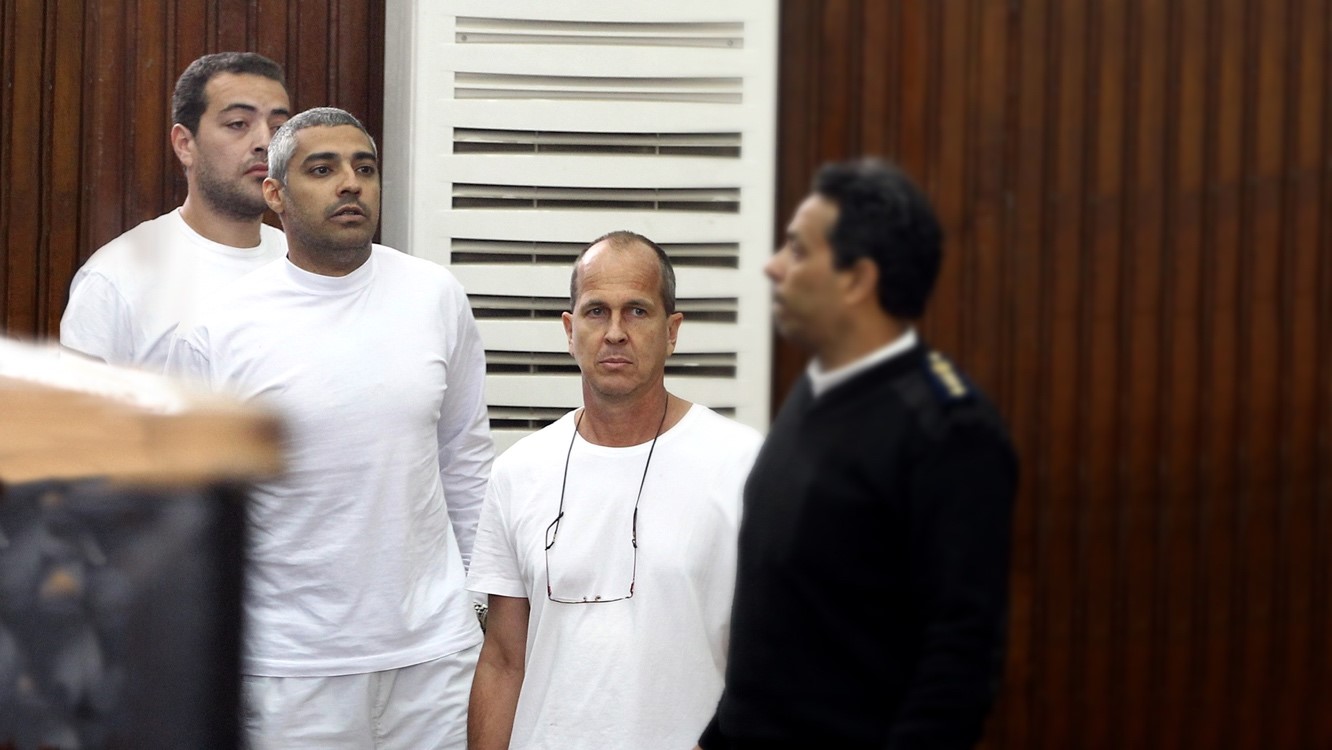
Egypt has gone on to introduce new legislation that makes it a criminal offence to publish anything that contradicts the official version of a terrorist incident. If you check the facts, discover that the government has been trying to cover up some inconvenient truths and publish what you know, you can be hit with a fine equivalent to more than USD 50,000.
But as the facts of the case began to unfold, an extraordinary groundswell of support emerged. It began with our professional colleagues, including some of our fiercest rivals. Hundreds of people from organisations like CNN and the BBC stood with their mouths taped shut, holding signs declaring “Free AJ staff.”
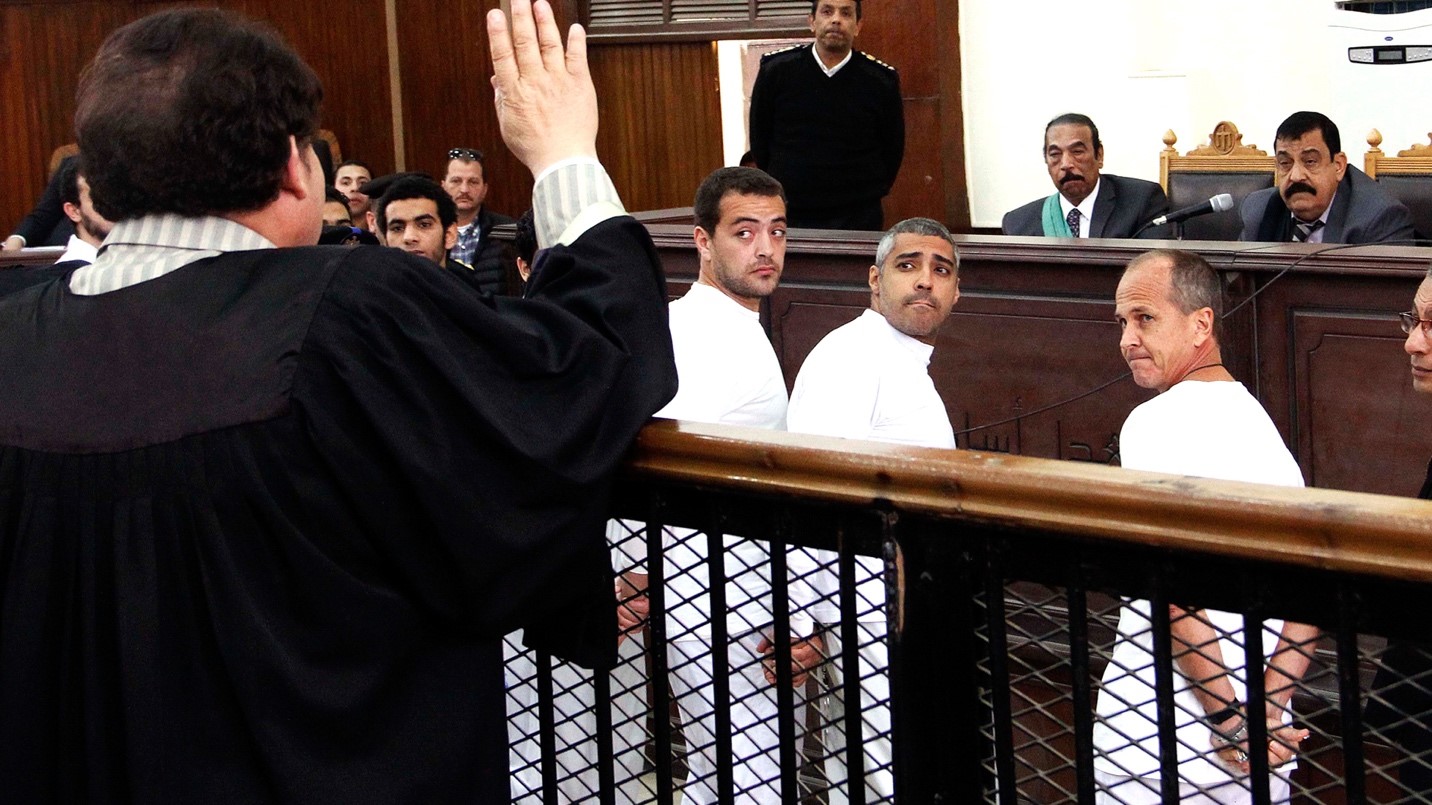
After this the public stepped up their support of us, first in the hundreds, then the thousands, then the millions and even the tens of millions. The #FreeAJStaff hashtag eventually got almost three billion impressions on Twitter – a truly extraordinary number by any measure. Next came the politicians. They lined up behind us with an extraordinary unanimity that is genuinely rare these days.
Professional Integrity as Your Strongest Defense
In this new environment, what should our response be? What is the safest way of protecting ourselves and doing our jobs with integrity and professionalism?
The temptation of course is to give in to pressure from both sides and cede the battleground to the belligerents, relying instead on whatever we are told through official channels. It is easy to simply quote from one side and the other, without trying to get to the truth. We can put politicians on air without challenging their assumptions, arguing that we are “only doing our jobs” by transmitting what they say.
We literally become “the medium” – the means by which others transmit their message, but that makes us no better than social media, acting as megaphones for the lies and distortions of others. It feels safe because nobody gets upset with us, but it is not very good journalism. And
our experience in Egypt suggests that it is not as safe as it might seem. In the end, our greatest defense as reporters – indeed our only defence – is our own professional integrity.
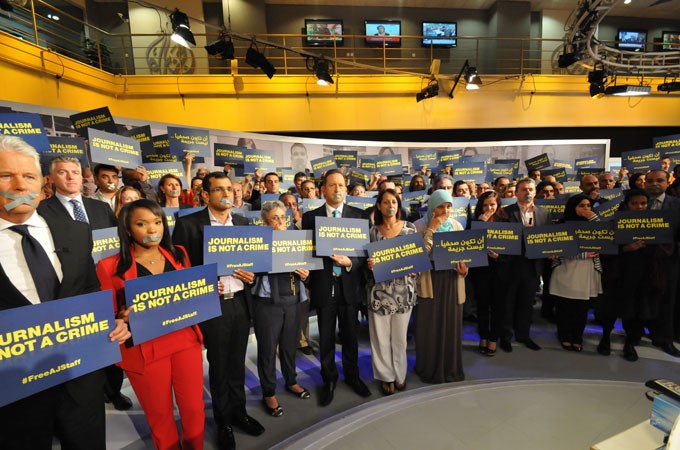
The point is that vast support we had while being on trial emerged because everyone came to understand that we had always remained true to the highest ethical standards, not just in our reporting of Egypt, but throughout our careers.
If anyone of us had lapsed in the past; if we had somehow given in and published blatantly biased or inaccurate reports, our critics in Egypt would have jumped on them with glee and trumpeted it from the rooftops.
Nobody – our colleagues, the public, the politicians, none of them – would have had any confidence in our professional integrity, and they would have started to wonder if perhaps the allegations were true. Our support would have crumbled to dust and we would likely still be in prison.
For all the cynicism about journalism and the media in general, there is still an understanding amongst the public that what we do is, in fact, pretty fundamental to the way our societies work.
They know – you know – that for all the criticism that gets levelled at the media, democracy does not work unless there is a free exchange of ideas and information; and a watchdog keeping track of those who make decisions in our name.
People backed us partly out of outrage at what we were going through at a personal level. But they also shouted because they recognized and believed in the fundamental importance of the values that we three came to represent – freedom of speech; freedom of the press; and the rule of law in a properly functioning society.
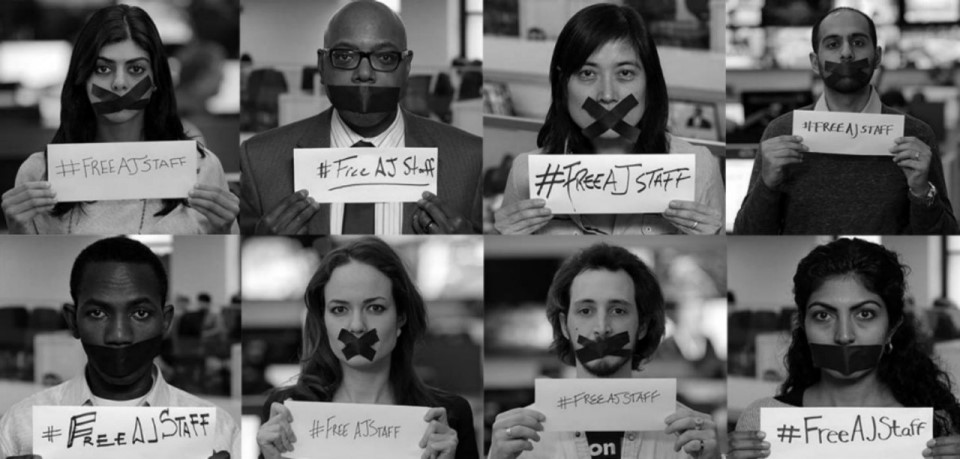
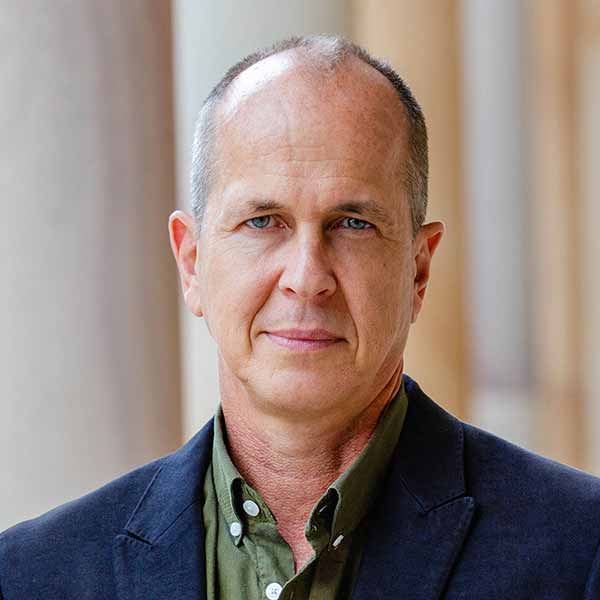


















![Palestinian journalists attempt to connect to the internet using their phones in Rafah on the southern Gaza Strip. [Said Khatib/AFP]](/sites/default/files/ajr/2025/34962UB-highres-1705225575%20Large.jpeg)




















